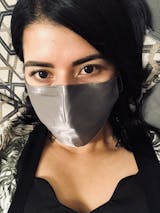As consumers, we are becoming more aware of the ingredients we expose ourselves to. But reading the labels of our favorite beauty products can often be precarious, to say the least.
You may have noticed over the years a number of familiar words showing up on labels of packaging on many skincare and beauty products. These are known as “buzzwords”, and they are marketing's biggest weapon to get consumers to buy.
Most of us have purchased something on the grounds that it says on the packaging how amazing it works, only to get home and realize we’d been duped. But has that made you question whether other common phrases and buzzwords are in fact truthful?
We’ve gathered 14 of the most commonly used buzzwords in beauty in 2021, and we explain what they really mean, so you can make more educated purchasing decisions.
What Are Beauty Buzzwords?
Let’s first define what buzzwords are. As marketer Ben M. Roberts puts it: “buzzwords are a newly created term or phrase that seeks to define a marketing activity.” He also goes on to explain that “... buzzwords are there to seek to bring together relevant marketing content under a single usable word that can make the content understandable for a specific audience.”
But when do buzzwords go from being helpful to their audience, to being just downright fabrication?
The Truth About Buzzwords in Beauty
It’s no secret that marketing tactics are often embellishments of the truth. But sometimes an embellishment is an understatement. In many cases these embellishments are just downright, blatant disinformation. But it can be hard to tell when they are. So let’s dive right in.
Chemical-Free
Chemicals are all bad… right? Not even close, my dear friend. Did you know that every single thing that you can see right now is made up of chemicals? The water you drink. The shoes you wear. The food in your refrigerator. Everything.
Chemicals are simply any substance made of matter. Everything is made up of matter. So how can a product claim to be chemical-free? This is a marketing ploy, if ever I did see one.
Hypoallergenic
You’ve probably seen this word being used to describe products that don’t trigger allergies, or an allergic reaction. But you may be surprised to know that, in skincare, this word doesn’t really mean anything.
The FDA states “There are no Federal standards or definitions that govern the use of the term hypoallergenic. The term means whatever a particular company wants it to mean”.
There is no real way to guarantee that a skincare product won’t cause an allergic reaction, thus making the “hypoallergenic” label nothing but a marketing move.
Non-comedogenic
Just as the term “hypoallergenic” is not regulated by the FDA, neither is “non-comedogenic”. A product can claim that it doesn't clog pores, but there really isn’t a way to approve or regulate these claims.
Brands using this term are just trying to market their products to appear more desirable to those who don't want clogged pores—which is all of us. It’s a vague and subjective measure by which we should be purchasing with caution.
Dermatologist-Tested
This could be one of the most misleading labels on skincare products. “Dermatologist-Tested” may sound like the product was meticulously analyzed by a team of dermatologists in a lab, and then approved for its efficacy. But the truth is, this could just mean that one dermatologist tested one ingredient, and that it may not have even passed the test—whatever that test may be.
This is a case of finding out what isn’t being said in a statement. Dermatologist-tested for what, exactly? Were the results successful? These are things we don’t usually question, but it might be time that we did.
Clinically-Tested
We automatically think that a product is better because it’s been “clinically-tested”, but again, what does that even mean? Did the product pass the clinical test? Why do skincare products even need a clinical test? Are they medical-grade? There are so many unanswered questions that tend to follow this buzzword.
Patented Technology
“This product uses patented technology”. Patented technology sounds really good, doesn’t it? It sounds like it must work really well, right? But it actually doesn’t mean that the patented ingredient or product is effective. It just means that the brand was able to patent that technology before anyone else could.
Always read the label beyond the patented sticker. How does the technology work? What are the results they’ve achieved from this technology? Why is it better than other products on the market?
Anti-aging
The anti-aging movement is huge, as consumers are all on a path to look more radiant, more youthful, and less wrinkled. Buzzwords like anti-aging, age-defying, and regenerative are used by marketers to capture our attention, and place a product above its competitors in the eyes of consumers.
Which are you more likely to buy: An eye cream for fine lines… or an Anti-aging, regenerative eye cream?
Unscented
Many of you may not know that the fragrance industry is unregulated. This is to protect perfume brands from disclosing their secret formulas for their products. This also means that, legally, brands can add fragrance to their products, and all they need to disclose on the labels is “fragrance”, “perfume”, “parfum”, or “aroma”.
We, as consumers, never know exactly what is in fragrance, and it has been documented that some fragrances can contain hormone disruptors, skin irritants, and even carcinogens. So, it’s not surprising that most of us opt for fragrance-free products where possible.
But do not be mistaken. “Unscented” does not mean “fragrance-free”. Unscented means that chemicals have been added in order to mask the smells of the rest of the ingredients. So instead of getting something with less ingredients, you’re actually buying something with more ingredients. Sounds misleading, doesn't it?
For all skin types
When a brand markets their product as being for all skin types, I often wonder about it’s efficacy. That’s not to say that some products are false in saying that they can be used on all skin types. But often what can be used on oily skin, is not going to be as effective as those with dry skin, and vice versa.
It’s always advisable to research the specific ingredients in a product to determine whether it will be appropriate for your skin type. And if in doubt, just opt for a product that says it is for your specific skin type or concern.
FDA approved
We always look to see if things are FDA-approved. But do you know what the FDA does?
Taken from their website, “The FDA does not develop or test products before approving them. Instead, FDA experts review the results of laboratory, animal, and human clinical testing done by manufacturers... the agency has determined that the benefits of the product outweigh the known risks for the intended use”.
The FDA does not approve any element or claim of skin care products before they hit the market. They only stipulate that the product being sold is safe to use in the manner in which the manufacturer says.
So with that being said, the FDA stamp of approval really doesn’t hold much weight in the beauty industry. So it’s actually advisable to always read labels beyond that FDA stamp.
Botanical/Natural
This is a misleading statement, as brands use this word to describe anything that is similar to something botanic (plant-based). So, in many cases it is a synthetic version that is often cheaper to manufacture.
Take Sodium Coco Sulfate, for example. Labels often put “coconut” in parenthesis after this ingredient. But synthetic Sodium Coco Sulfate, a skin irritant, must not be mistaken for Sodium Cocoyl Isethionate, which is derived from real coconuts.
These terms are highly unregulated in the industry, so while it can be tricky to navigate what is actually botanical or natural, the best way to truly know is to read the ingredients.
Non-Toxic
When we see the label “non-toxic” on skincare, this suggests that any product without that label is toxic. This is just not true. This is a marketing tactic that makes the consumer buy the product that claims to be “non-toxic” over the one that doesn’t make mention of it at all.
But the truth is, any product that has been approved for the market is going to be non-toxic. It’s just whether or not the ingredients are better quality, or not.
Firming
What you’d expect from a “firming” skin product is for your skin to feel tighter, but in reality, there is just no way to measure these results. Results like these are completely subjective, so you should be mindful of any skincare products that boldly claim to “firm” your skin.
Clean
When looking for clean beauty products, think of it the same way as clean-eating. On a clean-eating diet, you’d eat whole, unprocessed, fresh foods, that have a shorter shelf-life, that contain no synthetic ingredients, and are preservative-free.
Brands that claim to be “clean” beauty brands should follow the same kinds of guidelines. But you’ll find that most brands are not true “clean beauty” brands, as they often contain things like preservatives. Always read the label.
Transparency in Beauty
The problem we face in this competitive beauty industry is that brands are not 100% transparent. The way brands market their products is always going to blur the lines of moral integrity, or at the very least, be purposefully vague in order to appear more appealing to consumers.
When it comes to marketing buzzwords in skincare, it’s important to think about what isn’t being said about a product. Dermatologist-Tested… tested for what? Clean... but what does the brand consider as not clean?
At Fait avec Coeur, we have done the research for you to ensure quality control of our partners and their products. So if you’re not one for researching, or you’re time-poor, check out our range of products, we have skincare for everyone. See our range here.
Emma Masotti is an Australian now living in Austin, TX, and has been a trained esthetician for over 15 years. She is a sustainable skincare writer, educating and building awareness around proper skin health that doesn’t cost the earth.
Some of the products promoted in our blog are from our online store. Many others are brands we have researched and found to be great examples of sustainable, ethical, and innovative brands in their field, and we don't make any profit from mentioning them in our blog. #CollaborationOverCompetition










